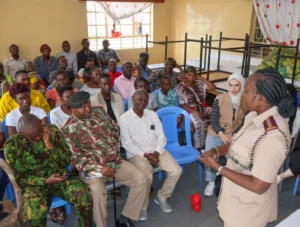Baringo County Police Commander Mr. Robinson Ndiwa (third from the left) with the Deputy Ward Commander Kabarnet Mr. Maiyo (On the extreme right) together with other officers displays the charters for Kabarnet, Loruk and Nginyang Police Stations respectively.
National Police Service, Customer Charters are important tools at the police station level that aid effective service delivery, however, most of the officers at the stations are still not conversant with its components which affects their ability to deliver services effectively.
But to begin with, as part of the Police reforms, the Constitution of Kenya in Article 243 establishes the National Police Service which comprises of the Kenya Police Service and the Administration Police.
Article 244, therefore, establishes the Objects and Functions of the National Police Service; it records that;
The National Police Service shall-
(a) strive for the highest standards of professionalism and discipline among its members;
(b) prevent corruption and promote and practice transparency and accountability;
(c) comply with constitutional standards of human rights and fundamental freedoms;
(d) train staff to the highest possible standards of competence and integrity and to respect human rights and fundamental freedoms and dignity; and
(e) foster and promote relationships with the broader society.
The above objects and functions are constitutional provisions that set the ground on how the officers under the National Police Service should operate and serve the public, this is emphasized further through the National Police Service Customer Service Charter which is a very critical tool in the operations of the police officers at the police station level.

The Ministry of Interior and National Coordination with the support of REINVENT engaged a team of consultants to develop new National Police Service Charters taking into account the merger between the Kenya Police Service and the Administration Police which spells out how services are to be delivered at the police station level. Through our deliberations with the consultants, two of the charters were deemed important in MIDRIFT HURINET Policing work (i) The National Police Service Customer Service Charter and (ii) The National Police Service, Service Standards.
The National Police Service Customer Service Charter spells out the police policing commitment which shows; how the NPS should treat clients in humane mannerisms, how police should provide a professional service, protection of customers, witnesses as well as suspects, how to provide feedback on NPS and its officer’s performance, how to lodge complaints against police and finally their contacts.
On the other hand, The National Police Service, Service Standards spells out the services which are offered at the station level, the charges and the timeline for those services. These Service Standards timelines may be adjusted to suit circumstances on the ground. In an emergency, call Police Hotlines: 999/112/911 for assistance. Towards the end of the service standards, the NPS gives the location of the NPS headquarters, the contacts, the website, Social Media handles and the hotline number which has been mentioned above.
National Police Service charters are therefore crucial documents for enlightenment of effective service delivery at the station level. This customer service charter sets out the NPS response policy upon contact with clients. The NPS must therefore be committed to providing the community with responsive and meaningful customer service. Ensuring that they maintain quality customer service must therefore be one of the highest priorities of every officer. The Customer Service Charter states NPS’s commitment to the communities that they serve.
In 2020, Midrift Human Rights network conducted a survey in six police stations of Naivasha, Njoro and Kaptembwo in Nakuru County and Kabarnet, Loruk, and Nginyang’ police stations in Baringo county on the availability of the National Police Service, Customer charters. The findings were that the police stations did not have the new National Police Service charters, rather had old charters which were of A4 size and were not eligible, the charters were also not strategically placed. Midrift addressed this gap by printing and disseminating the charters in all the 6 stations.
The following are the two types of charters which were printed and disseminated by MIDRIFT HURINET



